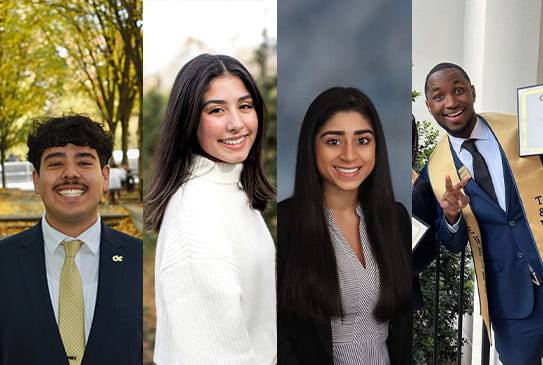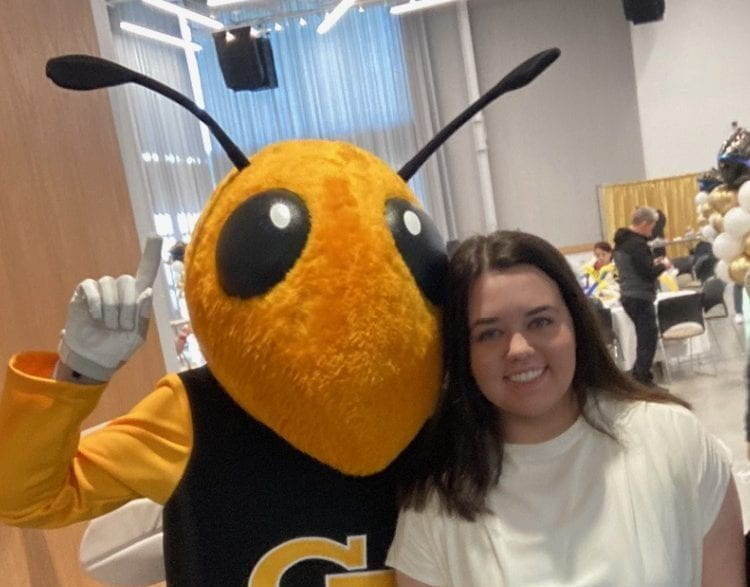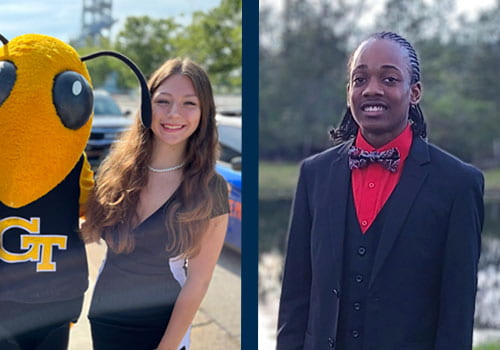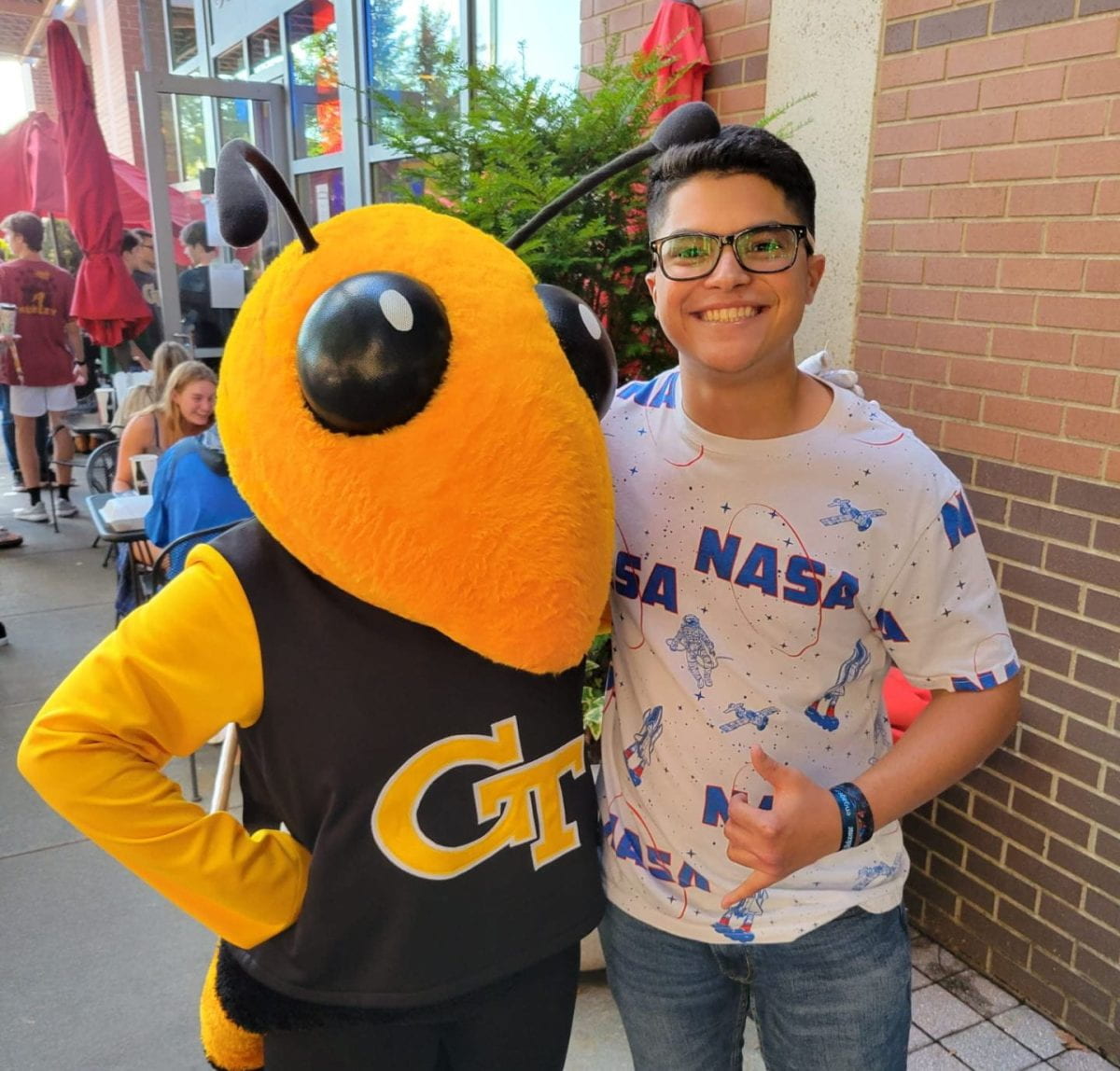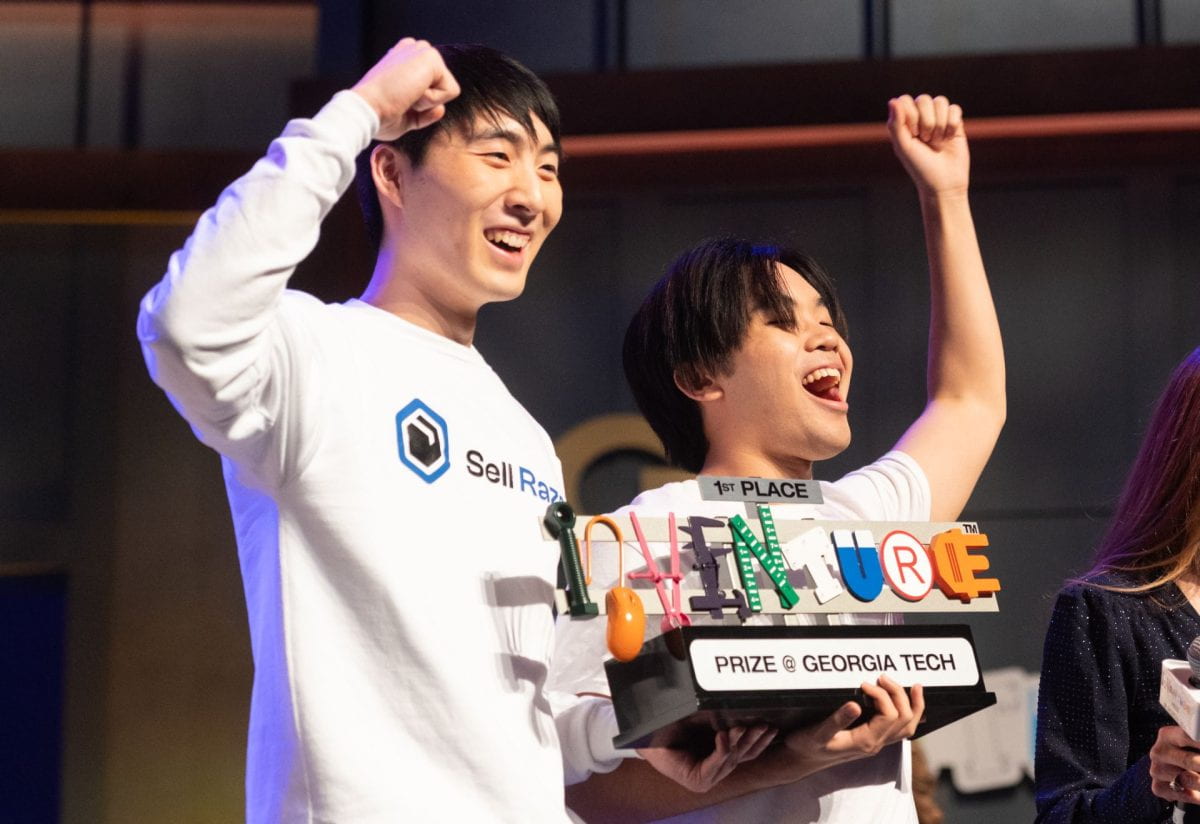Tag: Student Features
What’s in a Promise?
For Cameron Barnett, the G. Wayne Clough Tech Promise Program was likely the only way she could attend Georgia Tech. Now freshly graduated with a debt-free degree, she reflects on her time at Tech and mentor relationship with professor and Tech Promise donor Bill Todd.
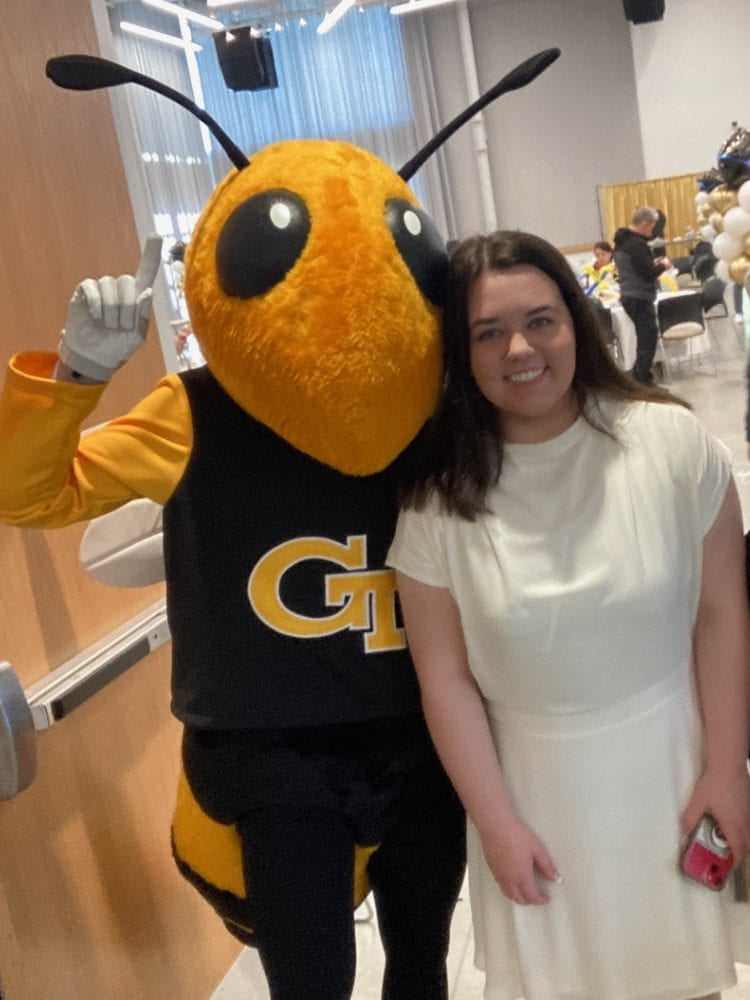
When Bill Todd, Professor of the Practice in the Scheller College of Business at Georgia Tech, first met Cameron Barnett, she was another student in Todd’s open office hours — discussing class, life, and everything in between.
At some point, the G. Wayne Clough Tech Promise Program — which provides a debt-free degree experience at Tech — came up in conversation. Todd, a proud advocate and donor to the program, was discussing his involvement and hopes for the scholarship. Little did he know, Barnett herself was a Tech Promise recipient.
Upon hearing Todd’s words about the scholarship and his personal support, Barnett began to cry.
“Tech Promise changed my life,” Barnett said. “It’s probably the only reason I was able to come to Tech.”
A 6-year-old Barnett was sold on attending Tech following a conversation with her mom discussing the rigor and prestige of the Institute compared to other universities in the state. From then on, Barnett describes her drive to attend Tech as a passion.
However, as the eldest of seven and unable to take out loans, Barnett knew that paying for college was a non-starter without meaningful financial help from the Institute.

As she researched scholarships to decide whether she could make her Tech dream a reality, she discovered the Tech Promise program. When she was admitted to Tech, she was not initially given the scholarship, but she contacted the Office of Scholarships and Financial Aid to explain her situation. Afterward, the office allotted her a space in the program.
Todd and Barnett have maintained a close mentorship since their initial meeting. When asked to describe Barnett, Todd is quick to describe her wit in class, her perseverance, and her sense of gratitude. Gratitude, in particular, is something Todd finds most compelling about Tech Promise and the value it brings out on campus.
“The culture that created Tech Promise didn’t come out of thin air,” said Todd. “We have a culture of appreciation, a culture of gratitude that makes it possible for us to support students in this way.”
Barnett graduated in December 2023 with a degree in business administration. Among her favorite classes were Todd’s as well as one where she served as a business consultant for the Campus Recreation Center, developing a plan for improvement to boost student engagement and functionality of the center. In Todd’s classes, she enjoyed writing case studies evaluating certain business aspects of healthcare systems.
Now, Barnett is taking a gap year from school to prepare for the LSAT and apply for law school while also working as a project manager at Koch Industries. Reflecting on her time at Tech, she describes it as transformative.
“I love to learn, so being able to do that at the level of Georgia Tech was exciting for me,” said Barnett. “Tech challenged me, and I really enjoyed that. I was never bored, and there was always something meaningful to contribute to.”
Barnett joins over 1,000 Tech Promise scholars who have graduated from the Institute without taking on any debt. Not only does it provide a debt-free education, but in Todd’s experience, it also reshapes the entire system of a Tech Promise recipient’s community.
“Every Tech Promise student that we fund is another step forward,” said Todd. “And it’s not just that student who is affected by the scholarship – it’s their entire ecosystem. Their family, their friends, their church, their community. Suddenly, it makes a college education a possibility where it historically has not been, for more than just the student receiving the Promise.”
Supporting Students
Philanthropic support for scholarships and fellowships makes it possible for Georgia Tech to recruit the brightest, most talented students from around our state and around the world. Support students today.
Inaugural Val-Sal Scholars Share Their Journey to Georgia Tech
The 2023-24 academic year marked the first time the Georgia Tech Val-Sal Scholarship, a scholarship for eligible Georgia high school valedictorians and salutatorians, was awarded at Tech. Offered to 25 students for the inaugural year, the scholarship covers up to $5,000 a semester for those who may not be able to attend the Institute otherwise. Two Scholars reflect on their time at Tech so far and what brought them here.
Dayleigh Mims – first-year civil engineering major from Barnesville, Georgia
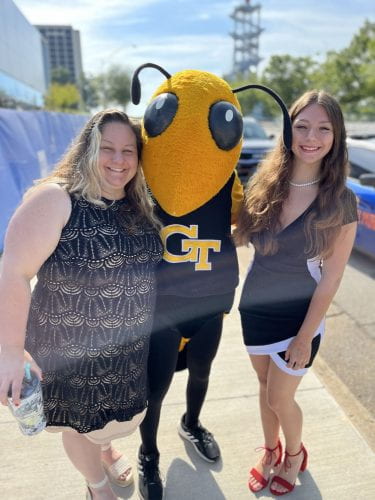
Despite her love of engineering, Dayleigh Mims did not originally see Georgia Tech as an option for her college career. Believing it to be too competitive, she wasn’t sure if she would get accepted. Not only did she get accepted, but she received multiple scholarship offers – one being the Georgia Tech Val-Sal Scholarship – which made her dream of Tech all the more accessible.
“I didn’t initially have my sights set on it,” she said. “But I spoke to a friend, and he told me not to limit myself and go for it. Obviously, I’m glad that I listened.”
Mims has always loved math. After moving to Lamar County High School from Stockbridge, Georgia, she found herself outpacing the math courses available. This ultimately led to her involvement in her high school’s gifted internship pathway, where she worked for the math department and then the school counselor.
The counselor assigned her career readiness work, where Mims found engineering as a suitable outlet for her enjoyment of math. After realizing this, her counselor assigned Mims a project — analyzing the bridges in Lamar County. The project confirmed that engineering was the right path for Mims.
Now, as Mims moves in to her second semester at Tech, she’s finding her path and adjusting to college life. Mims looks forward to getting involved in more classes directly linked to her major.
Azaniah Blackmon – first-year mechanical engineering major from Ludowici, Georgia
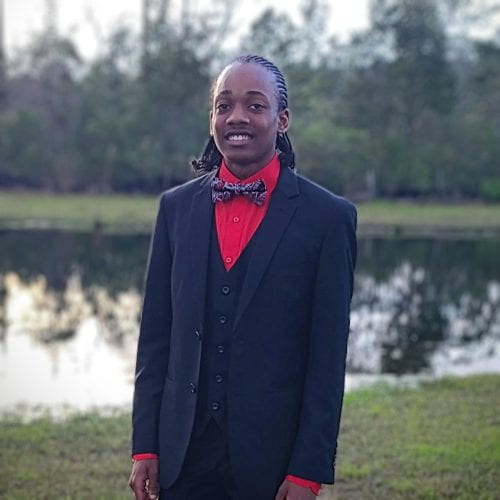
In high school, Azaniah Blackmon wasn’t sure where his next steps would take him. As he started his college planning, his parents were the first to suggest Georgia Tech to fit his engineering aspirations. Blackmon was quick to get on board given that he could study his passion at an elite institution while sticking close to home.
He applied, and received the Val-Sal Scholarship, confirming that Tech was the right choice. Since coming to campus in the fall, he’s enjoyed the opportunity to learn at an elite level while being close enough for his family to make the occasional visit.
When it came time to make a decision about which branch of engineering to pursue, Blackmon was stuck between mechanical and civil engineering. After some thought and time on campus last fall semester, mechanical engineering ultimately won out.
“I saw myself going further in that field,” he said. “I went to the career fair just to see what was out there in both fields and felt like there were a lot of directions to go within mechanical engineering.”
Blackmon spent last semester adjusting to the new types of coursework and exploring his interests. Chemistry was his favorite class of his fall semester, though he looks forward to getting involved with more major-specific courses as he builds his expertise.
Supporting Students
Philanthropic support for scholarships like the Val-Sal Scholarship makes it possible for Georgia Tech to recruit the brightest, most talented students from around our state and around the world. Support students today.
Circling Back on a Promise
Because of an opportunity to earn a debt-free degree through the G. Wayne Clough Georgia Tech Promise Program, Heather Johnston has been able to pursue her passions and give back to her community.
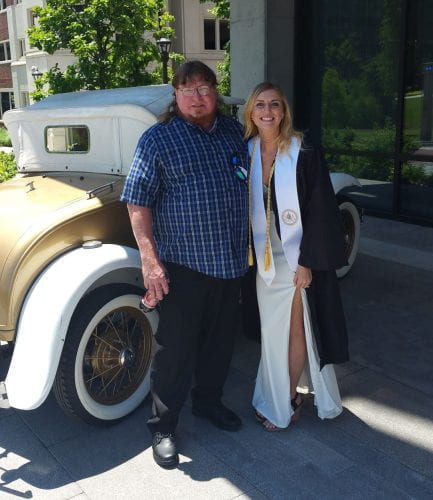
Georgia Tech alumna Heather Johnston, who graduated in 2017, attended Tech as a recipient of the G. Wayne Clough Georgia Tech Promise Program, a scholarship that makes it possible for qualifying low-income, in-state students to earn a degree at Tech debt-free. Now, she’s building a nonprofit based in North Georgia to continue a cycle of kindness.
“People have helped me every step of the way, and now I want to help people,” said Johnston, reflecting on her path from Tech to building her nonprofit, Blueprint Bridge, Inc., an organization dedicated to assisting individuals reintegrate into society after incarceration. “And the cycle just keeps going. That’s how the world gets better.”
Journey to Tech
For this native of Blue Ridge, Georgia, college wasn’t always on the horizon. Despite performing well in high school and enjoying academics, Johnston didn’t feel that she had the resources, or need, to go to college.
“I just didn’t know much about college at the time,” she said. “I didn’t know many people who went, and I didn’t know what you could really do with a college degree.”
But she still ended up applying to Tech on her high school’s Apply to College Day, and weeks later, she had an acceptance letter and the offer of a Tech Promise scholarship. Dealing with an abusive relationship at the time, the opportunity to get out of her hometown to attend college without accumulating debt was a game changer.
When she arrived at Tech, she found herself in the office of Jerry McTier, a financial aid advisor, for a mandatory meeting about her scholarship and managing her finances for the years ahead. As an 18-year-old who grew up in rural Georgia with limited means, financial management — and navigating the college landscape as a first-generation student — proved daunting. But with McTier’s help, Johnston was able to more comfortably navigate her years at Tech.
“The information gap is pretty big,” said Johnston. “If you haven’t had someone close to you go to college before, you don’t even know what you don’t know until someone tells you.”
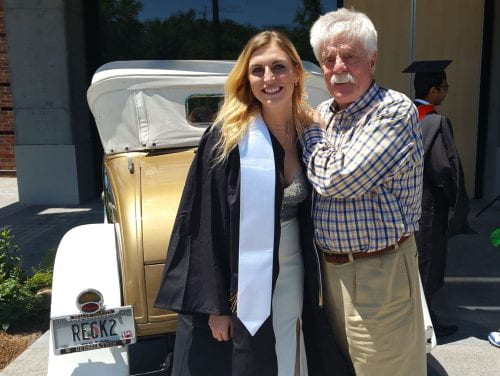
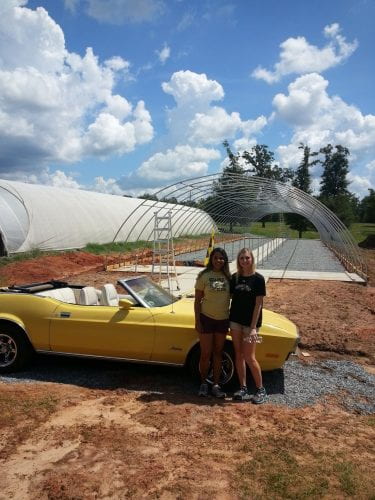
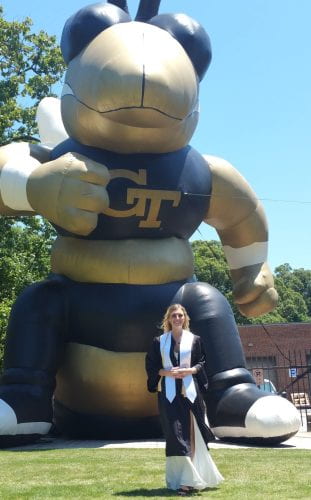
Continuing the Cycle of Giving Back
After graduating with her degree in public policy, Johnston worked for Georgia’s State Road and Tollway Authority but found herself wanting to do more to give back. After reflecting on her skills and passions, Johnston decided to apply to law school at Georgia State University.
Law school gave Johnston the know-how and inspiration that led her to turn her focus to the creation of Blueprint Bridge. As Johnston builds the nonprofit, she hopes the organization will be a resource hub for individuals who have been affected by the criminal justice system as they reintegrate into society.
“There’s a lot of little things we can do to be helpful,” said Johnston. “Tips on how to eat, how to call your probation officer, or where to get dental care. For a lot of people, these are the kinds of things that can be difficult to navigate.”
Johnston’s goal is for the organization to be something anyone can contribute resources to, and she hopes it will expand over time. Ultimately, she’s happy to have the opportunity to return some of the kindness she received to her home region.
“Growing up in a small town and then coming to college on scholarship really ingrained the community mindset,” said Johnston. “So, I always imagined I would put effort back into my community. I am thankful for what I’ve been given, and it makes such a big difference.”
Learn more about other Tech Promise scholars here and get information on how to give to the Tech Promise scholarship fund here.
Continuing a Promise
Because of an opportunity to earn a debt-free degree through the G. Wayne Clough Georgia Tech Promise Program, Andrés Robles Sotomayor is able to pursue his longtime passion and learn how he can channel that passion to give back to his country.
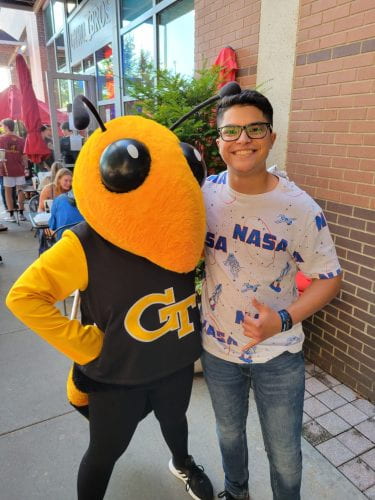
When Andrés Robles Sotomayor left his hometown of San Juan, Puerto Rico, to come to Hinesville, Georgia, he brought with him the determination to become an engineer. As he evaluated his college options and arrived at aerospace engineering for his career choice, Georgia Tech quickly became a top contender.
“It was one of the few universities that had an aerospace engineering program, and it was very prestigious and close to my interests,” said Robles Sotomayor. “Though, that wasn’t the only reason it was my top choice — it was also in-state, so I could stay closer to my mother.”
Receiving a Promise
Robles Sotomayor applied for admission and was accepted. However, as the son of a single mother working hard to make ends meet, he wasn’t sure what covering the cost of college would look like.
“I got in, and then my mom asked how we were going to pay for it,” he said. “And I told her ‘Well, that’s a good question. I don’t know, but I guess I’ll figure it out.’”
The solution Robles Sotomayor considered was joining the military to serve his country and support his career aspirations. The opportunity to receive pilot training drew him to consider joining the Air Force, but he knew it would mean dedicating a decade away from his mother, which Robles Sotomayor acknowledged would have been difficult.
But then he received the notification that he’d been selected for the G. Wayne Clough Georgia Tech Promise Program, a scholarship that makes it possible for qualifying low-income, in-state students to earn a degree at Tech debt–free. The offer came as a huge relief, especially to Robles Sotomayor’s mother, who was hesitant to see her son join the military.
“My mom went berserk,” recalled Robles Sotomayor on telling his mother about the scholarship offer.
Robles Sotomayor still plans to serve his country, but he’s happy for the opportunity to pursue his education first. Ultimately, he hopes to work in the defense industry in aerodynamics or as a flight test pilot.

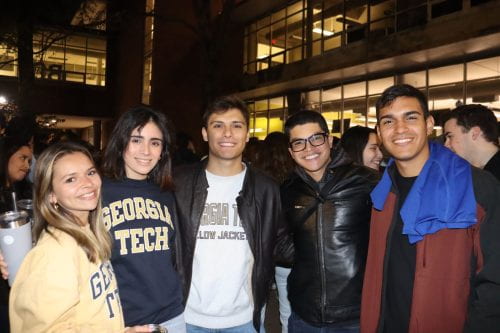

Time at Tech
Since coming to Tech, Robles Sotomayor has affirmed his interest in all things aerospace engineering: He is involved with Design Build Fly, a competitive aircraft design team, as well as the Society of Hispanic Professional Engineers (SHPE). He’s also expanded his interests to include hobbies like photography, a pursuit he fell into accidentally when SHPE needed a photographer last year. Now he’s the lead photographer for the group.
Robles Sotomayor was able to go to the National Convention for the Society of Hispanic Engineers through his work with SHPE, and secured a summer internship with Northrop Grumman, a defense and technology company. He spent the summer on-site in West Virginia, where he served as a technical intern for their Missile and Rocket Propulsion Division.
He plans to return to the convention this year, funded by Tech Promise. Now that he has manufacturing experience from Northrop Grumman, he’s excited to find an opportunity that moves him closer to his goal of aerodynamics.
Robles Sotomayor is thankful for the advantages Tech Promise has provided for him, especially when it comes to having the chance to focus solely on his education and enjoy just being a student at Tech.
“Tech Promise is a program that has helped me, and a lot of other lower-income students, have the opportunity to be here,” said Robles Sotomayor. “Students in this program have worked incredibly hard to get here, and they’ve earned a spot at a prestigious institution like Georgia Tech — without the worry of how to pay for it.”
Learn more about other Tech Promise scholars here. Get more information on how to give to the Tech Promise scholarship fund here.
Revisiting a Promise Fulfilled
Sarah Banks Hogg, a 2013 graduate from Georgia Tech, reflects on the value of a debt-free college experience, a privilege she enjoyed because of the G. Wayne Clough Georgia Tech Promise Program.
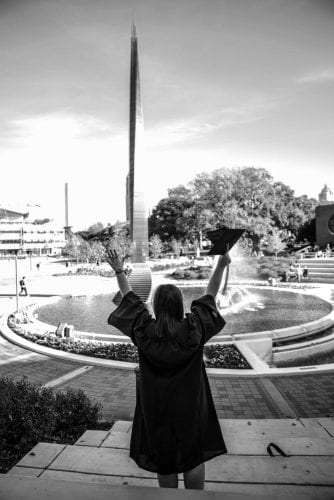
Sarah Banks Hogg vividly remembers opening the letter alerting her that she had been accepted to the G. Wayne Clough Georgia Tech Promise Program, a scholarship that makes it possible for qualifying low-income, in-state students to earn a debt-free Tech degree. She and her mother stood in the kitchen of their Habersham County home, as Hogg read the letter indicating that the family’s expected financial contribution to Hogg’s college education was zero.
“I had to ask my mom if it was real, if I was understanding it correctly,” she recalled. “I thought maybe it was a mistake, or it was only for a year.”
It soon became apparent that it was not a mistake, and Hogg’s time at Tech would be completely funded by the scholarship. This news came as a windfall to Hogg, whose family’s financial situation had changed drastically following the loss of her father to a battle with cancer when Hogg was 11 years old.
A Future Unclear
When Hogg first set her sights on college, she knew the expense would be a challenge. Regardless, she applied to Georgia Tech and was excited about the prospect of continuing her education. But the elation that came upon acceptance to Tech was quickly followed by the dread of having to discuss the financial implications of a college education.
“I didn’t want to have that conversation with my mom yet,” she said. “I just wanted to be excited before thinking about how we were going to pay for it.”
Luckily, after Hogg and her mother completed her Free Application for Federal Student Aid — commonly known as the FAFSA — she got that fortunate letter in the mail.
“The letter said the expected family contribution was zero, so my family wouldn’t have to pay for anything,” said Hogg. “And seeing that brought a sigh of relief.”
After she realized the offer was real, and that she would be receiving a Tech education without incurring any debt, Hogg was ecstatic. Finally, her dream was becoming a reality.


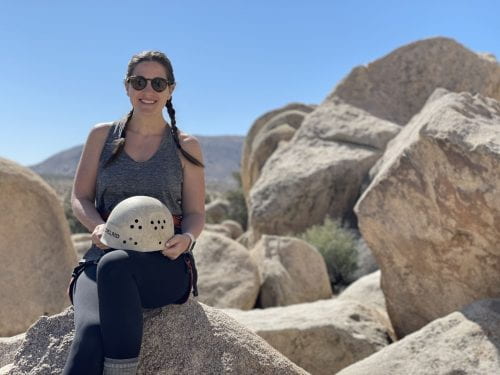
To Tech and Beyond
When she arrived at Tech, Hogg quickly immersed herself in the culture of Georgia Tech. She joined the Leukemia and Lymphoma Society, among numerous other clubs, and worked in the Office of Undergraduate Admission. Hogg was a proud Tech Promise ambassador during her time working in Admission, and she enjoyed telling prospective students about her experience and what they could expect from a Tech education.
All the while, Tech Promise was fully funding her time at Tech – including her semester abroad at Oxford.
Now that it’s approaching a decade since she graduated in 2013, she advises prospective students, especially those who receive the offer of Tech Promise, to embrace the power of a Georgia Tech degree.
“It’s like a switch flipped in people when I was interviewing for different jobs,” said Hogg. “People know that a Tech degree means that you have an excellent work ethic and that the learning curve between school and a full-time job for a Tech student is small.”
Hogg now works for CapTech Consulting, a technology consulting firm. As part of her work, she gets to come to Georgia Tech for recruitment fairs. For her, interacting with Tech students and showing them what awaits them after graduation is the perfect way to support her alma mater.
As she gets older, understanding the full impact of a debt-free degree has only made her more appreciative.
“I think about what it must have meant for my mom especially,” said Hogg. “She’s a single mom trying to make ends meet, and I think about what her child having the opportunity to go to college debt free would have felt like. It must have been a weight off her chest.”
Learn more about other Tech Promise scholars here, and more about Hogg’s story when she was a student at Tech. Get more information on how to give to the Tech Promise scholarship fund here.
Army Medic to NASA ‘Space Plumber’: An Army Veteran’s Journey at Tech
Corey Crisostomo served as a United States Army medic for seven years. During that time, he cultivated a love for engineering that brought him to Georgia Tech. For Veterans Day, we celebrate his time in the military and his path since.
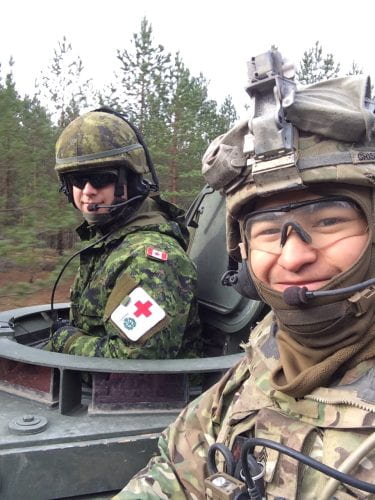
Corey Crisostomo’s passion for engineering first took root on medical calls during his time as a United States Army medic. In his seven years in the Army, Crisostomo often found himself fiddling with medical devices and thinking about how designs could be improved for the medics to use more effectively.
“I remember being on medical calls and messing with the equipment,” recalled Crisostomo. “I’d be thinking, who designed this? It doesn’t do what we need it to. This was made by someone who only thinks they know what we do.”
So, when his time in the Army ended, Crisostomo was set on pursuing this found interest in engineering. He enrolled at Georgia Southern University to complete his core classes, but Georgia Tech was always his end goal for its reputation in the engineering field.
After a year, he transferred to Tech as a mechanical engineering major via the Veterans Transfer Pathway, a program that assists veterans who have completed active duty within the past five years gain admission into Tech.
Crisostomo has now been at Tech for two years and rotates between semesters of classes and working as a NASA Pathways intern. In his role at NASA, he works as a cryogenics propulsion specialist on the Artemis Project, a job that others in the unit fondly describe as a “space plumber.”
“I make sure that all the valves and pumps involved with fuel delivery work correctly,” Crisostomo explained, “essentially making sure that fuel can get to the rocket’s engines so that it actually gets up into the air.”
The position has been enlightening for Crisostomo, especially when it comes to understanding the breadth of the field of engineering and where it can take him.
“I would love to help Army medics, and the more I think about it, the more I think I might want to follow that path,” he said, “whether that be with Army Medical Research or companies that interface with those products.”
Aside from attributing the inspiration for his engineering pursuits to his military experience, Crisostomo also credits it with helping him tackle the academic rigor of his Tech coursework.
“My time in the Army gave me the ability to know that I can do hard things,” he said. “The military gives you a lot of soft skills that help you frame problems and have a system for approaching a solution. Also, it teaches you how to operate in nearly any environment.”
To learn more about Georgia Tech resources for veterans, visit the Veterans Services page and the Veterans Resources Center.
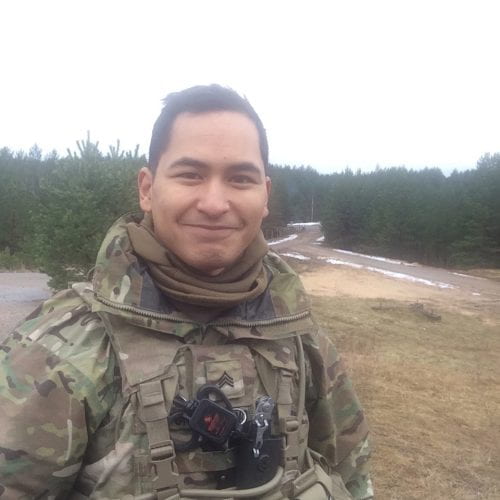
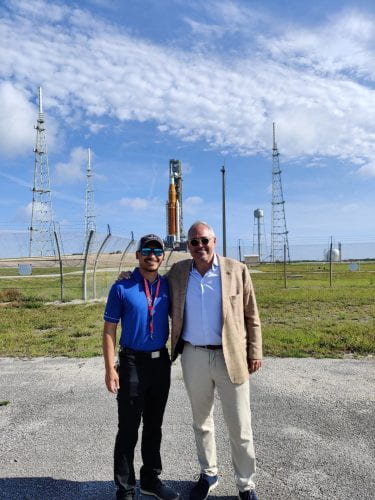
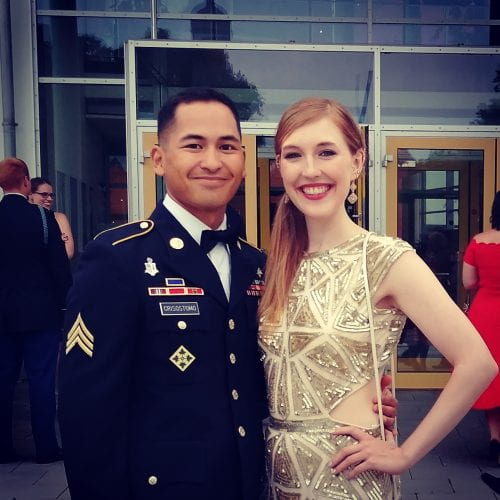
InVenture Prizewinning Transfer Students Offer Inspiration and Advice
Nearly 23% of the 2023 incoming class at Georgia Tech represents transfer students, so we’re highlighting a couple of them to mark National Transfer Student Week.
Tyler Ma and Jeff Mao, co-founders of SellRaze, transferred to Georgia Tech in pursuit of a driven college environment that would help them develop their startup. Now winners of the InVenture Prize, they reflect on their time at Tech and share student tips.
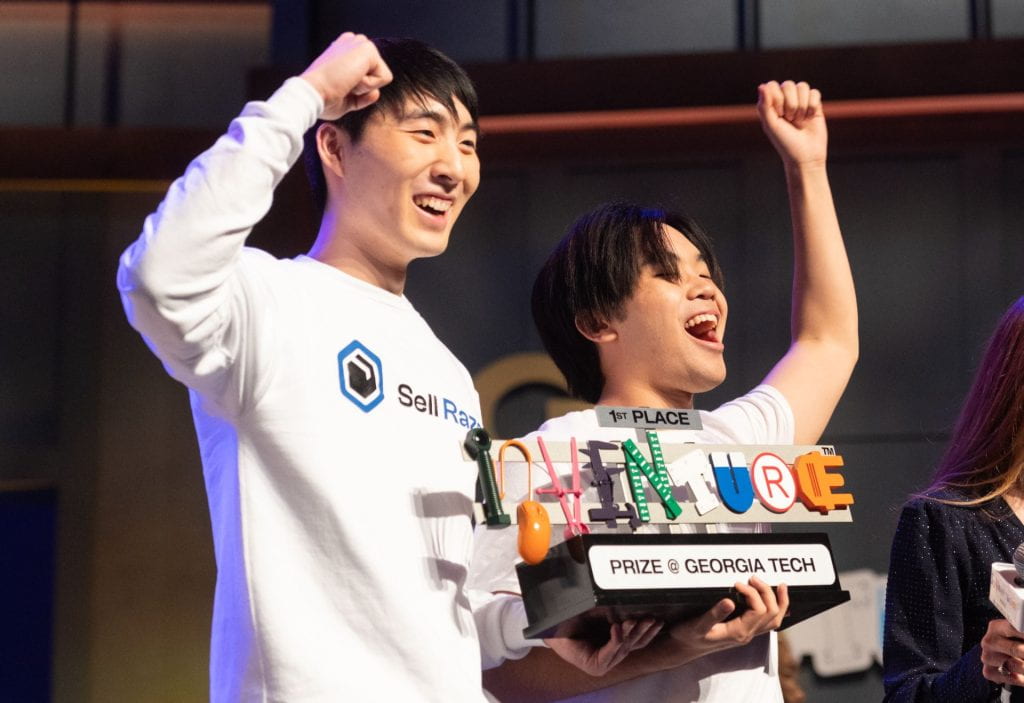
For 2023 InVenture Prize winners Tyler Ma and Jeff Mao, a college experience where they could foster their focus on innovation was key — a characteristic they found in spades upon transferring to Georgia Tech.
For Mao, the culture that drew him to Georgia Tech became apparent at a fall visit during the annual Moon Festival, hosted by the Vietnamese Student Association. Soon after, he began the transfer application process.
“People were overwhelmingly nice and passionate about their work,” said Mao of his visit. “Georgia Tech students are doers, and the campus caters to that within the learning environment.”
For Ma, Tech was always the ultimate goal. When he initially applied as a senior in high school, he was offered the Talent Initiative Transfer Pathway Program that granted him admission after a year at another institution.
Ma and Mao met during their time at their previous institution, becoming fast friends. Both computer science majors, the duo spent much of their time as first-year students thinking about how to use code to create the next billion-dollar idea and solve problems. In between classes and other commitments, Ma and Mao created SellRaze, an e-commerce management platform that helps businesses list their products on multiple platforms at once.
Ma did, in fact, transfer to Tech in Fall 2022 through the Talent Initiative Transfer Pathway Program, and Mao followed through the regular transfer process in Spring 2023. According to the two, coming to Tech allowed them to develop SellRaze even further.
Programs like Idea to Prototype challenged them to learn how to present, improve, and analyze SellRaze. It also gave them a mentor in the form of Caleb Southern, a beloved Georgia Tech professor in the College of Computing known for his care for Tech students. For Ma and Mao, finding someone they felt comfortable approaching for mentorship help was difficult as new students, but Southern readily accepted them as his mentees and became a key influence in the project. Southern since passed away, but Ma and Mao say he continues to be a motivational force for them.
“He was the one that got us to think beyond the back-end coding and into how everything actually looks,” said Ma. “I would advise other transfer students to seek out that kind of mentorship.”
It was during Mao’s first semester at Tech that the duo was able to enter the InVenture Prize competition, a faculty-led innovation contest for undergraduate students and recent graduates of Georgia Tech. According to Ma, it was something they didn’t initially see themselves doing.
“They played a video about it during orientation, and it felt so far beyond what we could do at the time,” said Ma. “But eventually, we met the winners from the past year and learned more about it. So even though it was something that felt way outside of our comfort zone, we decided to pursue it.”
For the two students, confidence-boosting, trusting the process, and breaking out of the comfort zone sums up many aspects of their journey and advice for others — even beyond transfer students.
“If you apply and don’t get good news back, that doesn’t mean you should necessarily give up,” said Mao. “I applied three times, but I think that everything happens for a reason.”
Today, Mao works on SellRaze full-time while Ma works on SellRaze and at Georgia Tech Research Institute.
Learn more about 2023 transfer students and transfer admission at Tech. Read the transfer pathway guide for more information on transfer pathways at Georgia Tech. Visit Tech’s National Transfer Student Week page to learn more about upcoming events and resources for transfer students and prospective transfer students.

